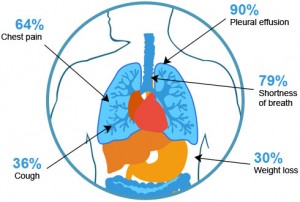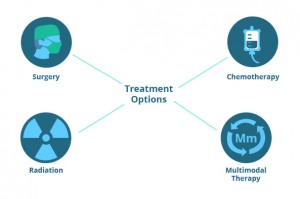Mesothelioma Life Expectancy
If you or a loved one has mesothelioma, you are among the thousands of people living with the disease. Mesothelioma affects people living with the disease and their loved ones in a variety of ways. This page takes a closer look at the physical, emotional and social impacts of the disease.
The incidence of mesothelioma, a fatal cancer usually associated with asbestos exposure, is increasing worldwide. It will increase for some years to come, particularly in developing countries where asbestos use is largely unregulated.
Symptoms
 The physical symptoms of the disease include pain, breathlessness, fatigue, coughing, disturbed sleep, loss of appetite and sweating. Most patients experience pain and breathlessness. That may limit their ability to function and interact socially. Coughing, appetite loss, sleep disturbance and sweating also are significant issues. Many patients have multiple physical symptoms.
The physical symptoms of the disease include pain, breathlessness, fatigue, coughing, disturbed sleep, loss of appetite and sweating. Most patients experience pain and breathlessness. That may limit their ability to function and interact socially. Coughing, appetite loss, sleep disturbance and sweating also are significant issues. Many patients have multiple physical symptoms.
Disease progress and treatment
Physicians observe a huge variability in the course of the disease, from a slowly progressive disease to a more rapidly advancing, aggressive illness. Because the symptoms of mesothelioma are common to many illnesses and mesothelioma is relatively rare, the disease often isn’t diagnosed until it has reached an advanced stage.

Mesothelioma remains largely resistant to treatment, despite advances in chemotherapy, radiotherapy and surgical approaches, according to an article in the European Journal of Cancer Care, which summarized 13 recent studies. The median survival rates vary from six to 18 months, according to the American Thoracic Society and the British Thoracic Society. A small number of patients may live three years or more.
As the disease progresses, medical intervention such as the drainage of pleural fluid, chemotherapy, surgery and admission to a hospital or hospice is often a necessity to control the symptoms, even though such interventions can cause distress to patients.
Life Expectancy
Mesothelioma is a relatively rare cancer with nearly 3,000 new cases reported in the United States each year, according to the National Cancer Institute. The life expectancy of patients diagnosed with mesothelioma varies from months to a few years depending on the type of mesothelioma and how advanced the cancer is when found. This prognosis is often depressing to the patients and their families.
Asbestos cancer is usually associated with workplace exposure to asbestos particles that are inhaled or ingested. This cancer is found most often among workers at companies that manufactured asbestos-containing products or workers in certain trades or industries that handled asbestos.
The forms of the disease include: pleural, peritoneal, and pericardial. The name identifies where it occurs in the body.
- Pleural, the most common form affecting about two-thirds of patients, occurs in the lining of the lungs and the walls of the chest cavity. Shortness of breath and pain in the chest due to buildup of fluid around the lungs are often symptoms of pleural mesothelioma.
- Peritoneal is a cancer involving the tissue lining the abdomen. It represents 20 to 30 percent of cases. Symptoms include weight loss, abdominal pain and buildup of fluid in the abdomen.
- Pericardial, which occurs in the lining around the heart, is extremely rare, representing less than 1 percent of cases.
A highly lethal disease, is often difficult to diagnose because it may not appear until 30 to 50 years after exposure to asbestos and its symptoms, such as shortness of breath or abdominal pain, are similar to those of a number of other more common illnesses.
For those reasons, doctors often do not definitively make a diagnosis of mesothelioma until the disease has reached an advanced stage, thereby making life expectancy short. At this point the patients’ treatment options are few, and no cures are available. A biopsy of tissue is required for a confirmed diagnosis.
Median Survival Rate
The median survival rate for malignant mesothelioma is 6 months to 18 months, according to the American Thoracic Society.
- A study of asbestos workers in the United States and Canada found that among 141 cases of pleural mesothelioma, 35 percent of the patients died within six months, 64 percent within a year and 94 percent within 24 months of the start of symptoms. The median survival was 10 months.
- Among 244 people with peritoneal mesothelioma, 54 percent died within six months, 88 percent within 12 months and 98 percent within 24 months. The median survival was significantly shorter: four months.
The British Thoracic Society says the median survival rate varies from 8 to 14 months depending on the study and type of mesothelioma. Still, the disease is progressive and the five-year survival rate and prognosis are very poor.
There isn’t a lot of evidence that surgical options to remove the diseased tissue alone enhances patients’ survival, the American Thoracic Society says. To be effective, the doctors must remove the membrane lining the lungs (in stage I) and the lung itself in more advanced cases; and often the lining of the abdomen and lining around the heart and portion of the chest wall. Even after such radical surgery, only about 11 percent of mesothelioma patients survive more than five years.
Patients may have a more favorable prognosis if the disease is diagnosed within six months of the onset of symptoms, still at stage I, where cancer cells remain contained within the lining of the abdomen, and no chest pain is evident, the American Thoracic Society says.
Because mesothelioma is hard to control, the National Cancer Institute is sponsoring research trials designed to find new treatments and better ways to use current treatment. In selected patients with less advanced cases of mesothelioma, doctors have achieved some improved survival rates by aggressive treatment, combining surgery to remove diseased tissue followed by chemotherapy and radiation. Although, none of these treatment options are cures for the cancer.
A new study by British researchers identifying a protein in pleural fluid that may be a reliable indicator of mesothelioma also offers hope of progress in achieving early detection of the disease. That could allow doctors an opportunity to treat patients while their disease is still in its early stages.
Toll on patients, families
Besides physical symptoms, mesothelioma exacts an emotional toll on patients and their families, including anxiety, depression and isolation. Patients and family members often feel shock, disbelief and numbness in reaction to the initial diagnosis. Most patients reported few health concerns before being diagnosed with mesothelioma, making the diagnosis all the more shocking. They feel a sense of isolation and anger at their deteriorating physical condition, their inability to function and the perceived hopelessness of the situation.
Because often mesothelioma victims can no longer do their jobs, they may feel a loss of identity and have feelings of anger and guilt at having developed the disease. Many patients experience anxiety and fear about what will happen next in terms of additional symptoms and the process of dying. Patients and caregivers often feel a lack of support in coping with the psychological impacts of the disease and end of life care issues.
The disease profoundly affects the family members and loved ones of those with mesothelioma. Patients and family members experience changes in identity and social relationships. The family dynamic alters. Often, the spouse or another family member assumes a primary role as caregiver. This burden puts stress on the caregiver’s physical and emotional well-being, particularly when he or she cannot relieve a loved one’s pain because of its severity. Caregivers may struggle to keep up with household chores and experience sleeplessness, tiredness and poor nutrition. They also often feel as if they’re not getting enough information and guidance from doctors and health care professionals.
More research needed
More research is needed on the impact of mesothelioma on patients and families coping with the disease, but this information offers some important insights about what to expect. If you or a family member has recently been diagnosed with mesothelioma, it’s important that you surround yourself with the support and resources to live with the disease.
For more information, or to purchase the full article, please see this link.
Understanding Your Prescriptions

There is currently no cure for mesothelioma, so most treatments are designed to slow the progress of the cancer or alleviate the discomfort associated with the disease. Treatments aimed solely at increasing patient comfort are termed palliative care and are an important aspect of the medications.
One of the most important aspects of your treatment is communicating with your physician – beginning immediately after your diagnosis. It is very important that you are able to talk to your doctor and ask any questions you may have about your condition or treatment, including your prognosis, new treatments, the management of treatment side effects and proper nutrition during your treatments.
Many doctors encourage patients to bring a list with them of any questions that arise between appointments. It is imperative to your treatment that you keep all appointments with your doctor, as well as any appointments for labs or treatments. Your doctor will want to monitor your progress as well as any side effects from your medications very carefully.
You should thoroughly discuss your medical history with any doctor who is prescribing medications for you, especially if it is the first time you have seen this particular physician. You should make a list before your appointment of all your prescription medications, over-the-counter medications and supplements (both herbal and nutritional) and give it to your doctor. Many medications interact with each other and this may worsen your condition or adversely affect the effectiveness of your medications.
After discussing your condition with you, your doctor may recommend some of the following medications:
Pemetrexed is a chemotherapy drug that slows the growth and spread of cancer cells. The use of pemetrexed has been used successfully to decrease pain and extend the lifespan and prognosis of cancer patients. It is most commonly administered by injection at a doctor’s office, clinic or hospital.
Cisplatin is a platinum-containing compound that slows or stops the growth of cancer cells. It is most commonly administered intravenously by an experienced healthcare professional. Cisplatin has been shown to be very effective in the treatment of mesothelioma, especially in conjunction with pemetrexed, but the patient must be monitored carefully for side effects as overuse of this drug can be fatal.
Endostatin is an Angiogenic Inhibitor that slows the growth of cancer cells by depriving them of an adequate blood supply. Because the cancer cells rely on a large number of blood vessels to grow, researchers believe that Endostatin will be an effective treatment for mesothelioma and other fast-growing cancers.
Gemcitabine is an antimetabolite, which prevents the production of certain proteins that tumors require for growth. It is used most commonly to treat pancreatic cancer and lung cancer (including mesothelioma). Gemcitabine is administered intravenously in a doctor’s office or hospital.
Epirubicin is an antineoplastic which works by interfering with the growth of cancer cells by allowing the body to kill them. It is usually given as an injection by a healthcare provider at a doctor’s office, hospital or clinic.
Intrapleural Interferon Gamma is injected directly into the lung cavity which has shown to be effective in early stages of diffuse malignant mesothelioma. The action of this drug is not completely understood, so consult your doctor for information on the following common side effects: diarrhea, fatigue, flu-like symptoms, headache, joint pain, muscle pain, nausea and discomfort at the injection site.
Doxorubicin is an antineoplastic medication that slows the growth and spread of cancer cells. Doxorubicin should only be administered by qualified healthcare providers in an office, hospital or clinic.
There are additional drugs being developed and tested for the purpose of cancer treatment. Your oncologist should be a good resource for more information on these experimental medications. It is important to follow the nutrition guidelines offered by your oncologist and physician during your cancer treatment.


